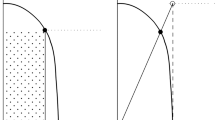Abstract
In this paper we compare several service disciplines commonly used in polling systems. We present a sample path comparison which allows us to evaluate the efficiency of the different policies based on thetotal amount of work found in the systemat any time. The analysis is carried out for a large variety of polling schemes under fairly general conditions and can be used to construct a hierarchy of the different service schemes.
Similar content being viewed by others
Abbreviations
- A l :
-
arrival epoch of thelth customer.
- A n(t):
-
number of type-n customers arriving to the system by timet.
- A n(t 1,t 2):
-
number of customers arriving at queuen during (t 1,t 2).
- B 1 :
-
service time of thelth customer.
- Q l :
-
queue that thelth customer joins.
- I(i):
-
index of the visited queue in theith visit.
- S i :
-
switch-over period succeeding theith visit.
- f, g :
-
service policies.
- τ i f :
-
epoch at which theith service period starts under policyf.
- f i (x):
-
number of customers served in theith service period whenx customers are present in the visited queue when it is polled.
- t i f :
-
epoch at which theith service period ends under policyf.
- L n f (t):
-
number of type-n customers already served by timet under policyf.
- C n f (t):
-
number of type-n customers in the system at timet under policyf.
- I f(t):
-
total amount of time the server was idle during (0,t) under policyf.
- U f(t):
-
total amount of unfinished work at timet in the system under policyf.
- C n f (τ i f ,t):
-
number of candidates at timet (τ i f ≤t≤t i f ) at queuei.
References
J.E. Baker and I. Rubin, Polling with a general-service order table, IEEE Trans. Commun. COM-35, 3 (1987) pp. 283–288.
O.J. Boxma, Workloads and waiting times in single-server systems with multiple customer classes, Draft, to appear in Queueing Systems (1989).
O.J. Boxma and W.P. Groenendijk, Pseudo-conservation laws in cyclic queues, J. Appl. Probab. 24 (1987) 949–964.
M. Eisenberg, Queues with periodic service and changeover time, Oper. Res. 20 (1972) 440–451.
S.W. Fuhrmann and Y.T. Wang, Analysis of cyclic systems with limited service: bounds and approximations, Perform. Eval. 9 (1988) 35–44.
W.P. Groenendijk, private communication (1988).
L. Kleinrock and H. Levy, The analysis of random polling systems, Oper. Res. 36 (1988) 716–732.
J. Keilson and L.D. Servi, Oscillating random walk models for GI/G/1 vacation systems with Bernoulli schedules, J. Appl. Probab. 23 (1986) 790–802.
H. Levy, Analysis of cyclic-polling systems with binomial-gated service,Performance of Distributed and Parallel Systems, T, Hasegawa, H. Takagi and Y. Takahashi (eds.) (Elsevier, 1989) to be published.
H. Levy, Optimization of polling systems: the fractional-exhaustive service method, Technical report, Dept. of Computer Science, Tel-Aviv University (July 1988).
L.D. Servi, Average delay approximation of M/G/1 cyclic service queues with Bernoulli schedules, IEEE J. Selected Areas in Commun. SAC-4 (1986) 813–822 (also correction in SAC-5 (April 1987) 547).
L.D. Servi and D.D. Yao, Stochastic bounds for vacation models with limited services,Performance of Distributed and Parallel Systems, T. Hasegawa, H. Takagi and Y. Takahashi (eds.) (Elsevier, 1988) to be published, also in Perform. Eval. 9 (1988) 247–261.
M. Sidi and H. Levy, A queueing network with a single cyclically roving server, Technical Report, Dept. of Computer Science, Tel-Aviv University (November 1988).
H. Levy, M. Sidi and O.J. Boxma, Dominance relations in polling systems, Technical Report 117/88, Dept. of Computer Science, Tel-Aviv University (November 1988).
H. Takagi, Mean message waiting time in a symmetric polling system,Performance '84, E. Gelenbe (ed.) (Elsevier Science North-Holland, 1985).
H. Takagi,Analysis of Polling Systems (MIT Press, April 1986).
Tedijanto, Stochastic comparisons in vacation models,Int. Workshop on the Analysis of Polling Models, Kyoto, Japan (December 1988).
Author information
Authors and Affiliations
Rights and permissions
About this article
Cite this article
Levy, H., Sidi, M. & Boxma, O.J. Dominance relations in polling systems. Queueing Syst 6, 155–171 (1990). https://doi.org/10.1007/BF02411471
Received:
Revised:
Issue Date:
DOI: https://doi.org/10.1007/BF02411471




